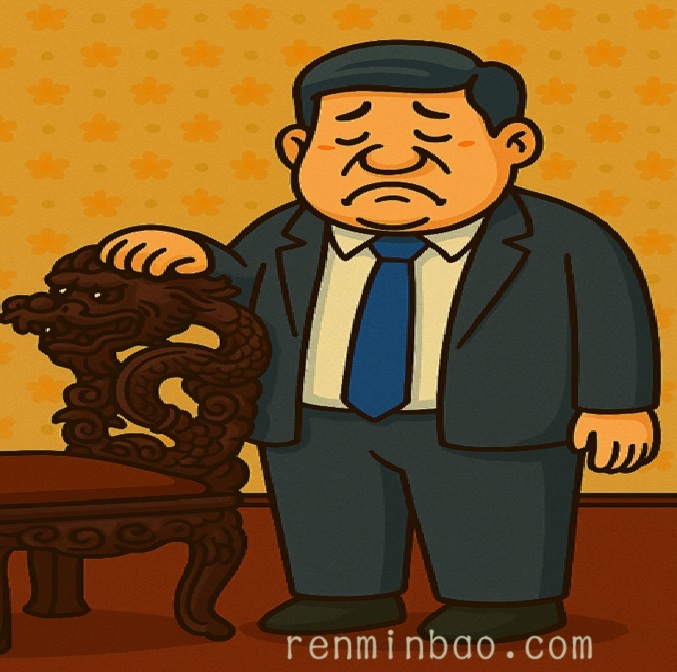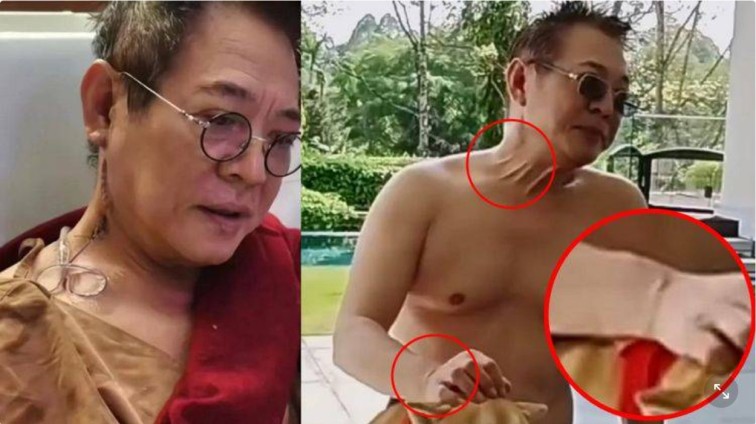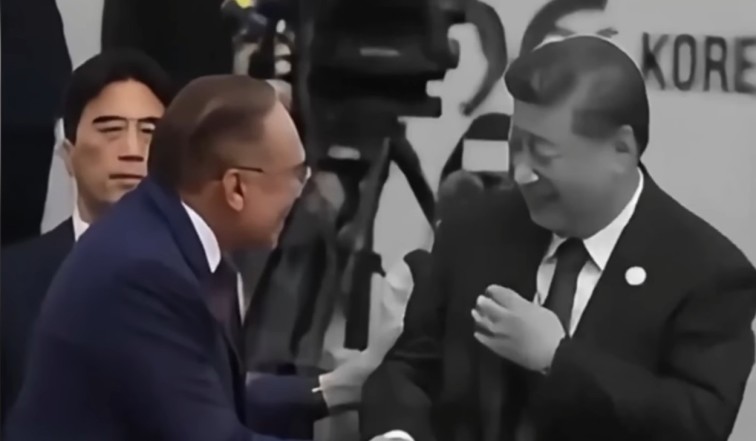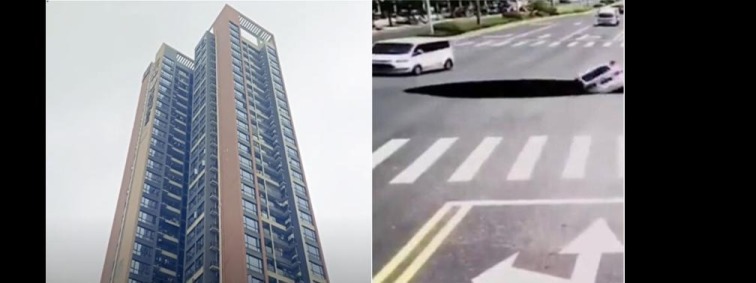The persecution has led to a backlash, resulting in a loss of power, and those in high positions are merely playing supporting roles. (Illustration by People News)
[People News] British medium Tai William recently stated in an episode that many of the perpetrators involved in the persecution of Yu Menglong are beginning to face backlash and retribution. In their fear, these perpetrators are desperately trying to cover up the facts surrounding their retribution, afraid to let outsiders know.
However, Xi Jinping, as the symbolic figure the CCP has retained to prolong its existence, along with the scandals surrounding his family, remains thoroughly concealed. Although he holds a senior position without real power, the fact that all party media have removed the name 'Xi Jinping' from the front page headlines is so significant that it cannot be hidden.
Self-media commentator Jiang Feng noted on November 6 in his personal channel 'Jiang Feng · Vision' that in recent days, national official media and websites have ceased to pledge loyalty to Xi's core leadership. 'This is not merely a policy adjustment or a transfer of power; it is a systemic reckoning, a collective decision within the system to remove the 'emperor's chair.' Everyone has agreed that this chair is no longer needed.'
Jiang Feng remarked that in recent days, the headlines of national official media and major newspapers have undergone a significant transformation. They no longer express loyalty to the core leadership but instead emphasise four words: 'study deeply and understand thoroughly.' For instance, phrases like 'Study deeply and understand thoroughly the spirit of the Fourth Plenary Session, continuously grasp the essence of the spirit' have taken over the internet overnight. Previously, the phrases 'two establishments, two safeguards' were standard in headlines, but now they have been relegated to less significant paragraphs within the text. This shift has caused unease among those within the system, as 'study deeply and understand thoroughly' is not merely a new slogan; it serves as a new code. Delayed realisation of this code signifies misplaced loyalty, while quick understanding and early withdrawal may be the only means of survival.
So, who possesses the power to compel Xinhua News Agency, People's Daily, and provincial party newspapers to collectively remove the term 'core'? Who has altered the subject of major official media headlines from Xi Jinping to the Party Central Committee?
Jiang Feng's analysis suggests that the propaganda department is the territory of whom? Li Shulei and Cai Qi are central figures in Xi's faction; would they voluntarily distance themselves from Xi? Would they remove 'two establishments' from the headlines? That is simply not feasible! Such an act would amount to political suicide. The crucial conclusion is that following the Fourth Plenary Session, the propaganda department has been taken over, likely by the military, which has infiltrated Xinhua News Agency and People's Daily. This is not a matter of 'unanimous opinion'; it is a case of 'military orders are as solid as a mountain'!
While Li Qiang, Ding Xuexiang, and Hu Chunhua remain in their positions, they are merely caretakers, not the new core. Officials at the provincial level and above have come to realise that whoever occupies the dragon throne is doomed; currently, the military listens to the Military Commission, not the Chairman of the Military Commission. 'Study deeply and understand thoroughly' signifies a farewell, a withdrawal, an exit from the game of Emperor Xi.
The 'Two Establishments' have not been abolished, but they have been respectfully removed from the pedestal; retaining the name is merely for appearances, while ceasing to be honoured is akin to a death sentence, representing true political demise. It is not about expelling you or executing you, but rather the entire party has chosen to overlook you. Everyone is implicitly aware of this, no longer lighting incense, bowing, or reciting scriptures. In this context, China's political scene has entered an era marked by the absence of Xi Jinping's 'core'.
How severe can this transformation be? It is so severe that even Xi Jinping's grip has been shattered! The faction led by the five major leaders has made their positions clear: Wang Xiaohong insists on 'firmly supporting the Two Establishments' to the end; Chen Wenqing has softened his tone; Chen Yixin and Zhang Jun are feigning ignorance; and Xu Yong has outright defected. One shows loyalty, three remain cautious, and one has turned traitor. The 'iron bucket formation' that Xi Jinping relied on has now become a broken net, fracturing from within, starting at the knife's edge.
When even the staunchest supporters begin to abandon ship, it signals that this vessel is truly on the verge of sinking.
With the political and legal system already fractured, local bureaucrats have found room to express their political language according to their positions. Following the Fourth Plenary Session, a quiet yet significant political alignment has unfolded simultaneously across various provinces, from Xinjiang to Fujian, and from Heilongjiang to Yunnan. The four characters of the 'Two Establishments' seem to have been uniformly silenced, collectively vanishing.
Jiang Feng highlights that the reason local warlords dare to rebel is simple: the military no longer heeds your commands.
Following the conclusion of the Fourth Plenary Session, the military convened an unprecedented learning conference with 1,100 participants. The presentation lineup featured a 10-member military committee group, and notably, Xi Jinping's name was entirely absent. Only three names from the ten-member list were disclosed: Zhang Youxia, Zhang Shengmin, and Liu Zhenli. This was a clear signal to all: the military will only heed the Zhang faction, effectively sidelining you, Xi Jinping, from the core of the military committee.
In a twist of irony, during the meeting, Zhang Shengmin, the vice chairman of the military committee, repeatedly stressed the accountability system for the military committee chairman. While it may have sounded like he was defending Xi Jinping, it was, in fact, a cleverly laid trap. Aren't you the one responsible as chairman? If so, why are the nine generals failing? Did you make the wrong choices? Shouldn't you take responsibility? Shouldn't you consider resigning in disgrace? The more Xi insists on accountability, the more they will demand it from you. This is a complete call for the emperor to fulfil his duty! Ultimately, they used Xi's own words to pin him to the institutional plaque he authored. The throne remains intact, but the emperor is no longer the original one.
As the two established norms were collectively muted, the power dynamics of the new era have quietly shifted to a new driver.
Jiang Feng noted a peculiar detail following the Fourth Plenary Session: the aides who used to serve tea and nod behind Xi Jinping have suddenly vanished from the scene. Previously, their role was to accompany Xi at significant events, but what about now? Li Qiang is now hosting the China International Import Expo, defining China's openness, and capturing the headlines. Ding Xuexiang has travelled to Uruguay in South America, independently representing China in foreign discussions. Hu Chunhua is even bolder, having already visited Nigeria, where he confidently signs agreements and makes headlines without Xi Jinping present. This is not merely an upgrade in treatment; it signifies an upgrade in authority. If aides can travel independently, it implies they no longer need to seek approval from anyone. If they can sign documents, it indicates that power has been delegated to them.
Do not assume that diplomacy is simply 'boarding a plane → shaking hands → taking photos → returning home.' Behind diplomacy lies the military, intelligence, security, and authorisation. Without the military's support, would aides even dare to step outside the country?
At the conclusion of the program, Jiang Feng highlighted that Li Qiang oversees the economy, Ding Xuexiang manages diplomacy, and Hu Chunhua is in charge of united front work. Each of them leads their own teams, has their own backing, does not compete with one another, and refrains from interfering with each other, much like three regents in a royal court. The only one without power is the original emperor himself. If something goes awry, he is not held accountable; the policies are not determined by him. They do not dismiss you, but they ensure you are left with nothing to do. They do not rush you, but they leave you with no tasks. The regency era has already commenced! △











News magazine bootstrap themes!
I like this themes, fast loading and look profesional
Thank you Carlos!
You're welcome!
Please support me with give positive rating!
Yes Sure!